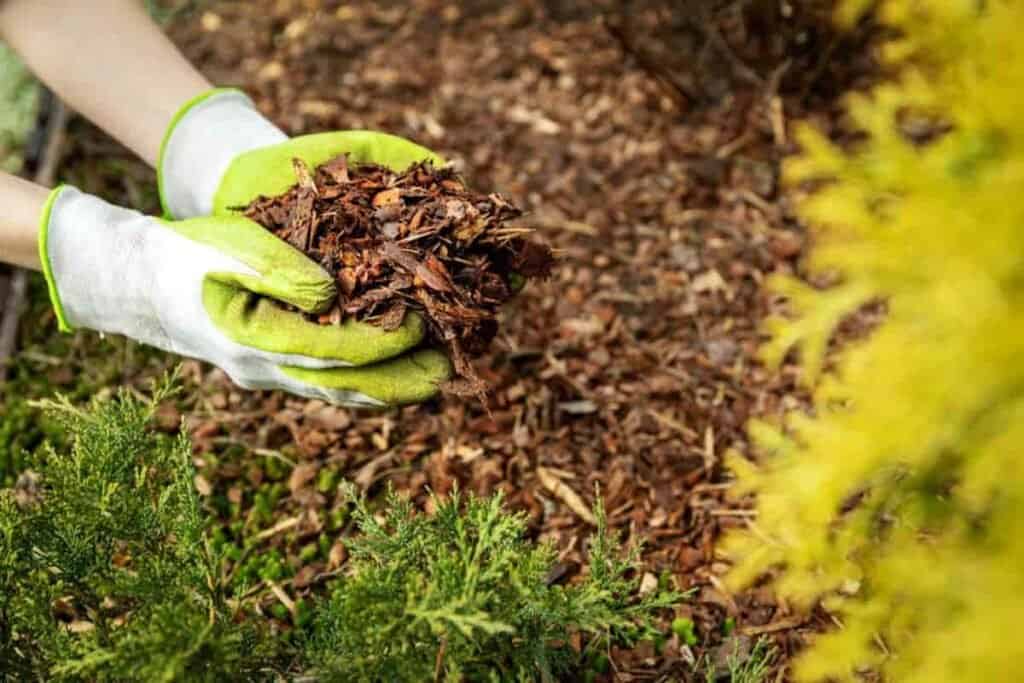Mulches, one kind or another, have been used since time immemorial. In some cases, they may have been of value.

In others, they may have been of little or no benefit. Many questions arise about the use of mulches and mulching practices.
What is a Mulch?
Roughly, a mulch may be defined as any protective covering of the soil.
This could be a covering laid down by Mother Nature, such as forest litter, the dead grass of the wild prairie, or the decaying deposits of marshy lands.
For our purpose, however, we can limit the definition to those soil covers provided by the gardener.
Kinds Of Mulch
Mulch may be merely a layer of dry soil or composed of straw, well-rotted manure, leaves, sawdust, pulverized peat, lawn clippings, other organic materials, paper, and sometimes even gravel, boards, or minerals such as glass wool.
Most home gardeners can find considerable amounts of mulching materials right at home in things that are ordinarily disposed of as waste.
Leaves, lawn clippings, vegetable tops, and the like can be used.
If they are worked into the soil as they partially decompose, they will add desirable organic material and fertility to the garden.
What Does Mulch Do?
As previously stated, mulch serves as a protective covering. Its chief function is probably to keep the soil surface from direct contact with the wind, warm, dry air, and the sun’s direct rays.
Incidental to this, many effects are produced, often beneficial to the plant’s growth.
Dust Mulch
Weeds can remove large quantities of water and fertility from the soil and thus, if not removed when small, become strong competitors for our garden plants.
In some cases, they may compete for light also. The killing of weeds, therefore, is the main purpose of cultivation. However, another function is to maintain a soil mulch.
Stirring Of Moist Soil Surface
Stirring a moist soil surface by cultivation results in forming a dry, loose layer that serves as a mulch over the moist soil beneath.
Such a mulch protects the moist soil from dry air and the sun’s direct rays. By so doing, it may affect the growth of plants in several ways.
Water moves upward in the soil through capillary action. If the soil surface is moist, surface evaporation may lose much moisture.
Dry Surface Soil
A dry surface soil mulch decreases or stops this capillary flow and thus may stop or cut down the surface’s moisture loss.
However, if the soil surface is dry before cultivation, there is little or no benefit derived from the soil mulch since a dry surface breaks the capillary action, whether the surface is loose or compact.
Cultivation and Mulching
In dry or semi-arid regions, by the time the soil is dry enough to cultivate into a mulch, most of the moisture which will be lost from the soil surface has already evaporated.
In such regions, turning up moist soil during the formation of a mulch often results in greater moisture loss than if the soil were allowed to remain uncultivated.
In humid regions, however, a soil mulch conserves moisture in most instances.
Soil Baking
Maintaining a soil mulch decreases heavy soil cracking and baking or crust formation.
Soil cracks permit the drying out of the lower soil levels with a consequent loss of soil moisture and detrimental effects on plants growing near them due to the roots being exposed to dry air or soil.
Run-Off Soil Particles When Raining
In some soils, the soil particles run together during rain, forming a compact, impervious surface. Run-off of moisture from such baked or crusted soil tends to be large.
The formation of a mulch on such soil tends to prevent run-off and may increase moisture absorption.
However, heavy rains may result in soil loss through its removal by washing. More soil also may be lost by wind erosion from the loose soil mulch than from the unmulched surface.
Maintenance Of Soil Mulch
Maintaining a soil mulch may benefit heavy soils by providing conditions that lend themselves to better aeration of the soil.
Oxygen in the roots of plants is necessary for plant growth.
It also is necessary to grow many beneficial soil bacteria, such as those which can change free nitrogen which is not usable by the plants into nitrate form, which the plants can use.
Soil Bacteria: Decomposition of Organic Materials
Soil bacteria also are necessary for the decomposition of organic material with the consequent release of many elements necessary for plant growth.
On light soils, however, the formation of a soil mulch seems to have little effect on soil aeration.
To summarize briefly, the dust mulch may be of benefit in conserving moisture and fertility through the elimination of weeds on all soils;
- In conserving moisture on heavy soils in humid regions,
- In preventing run-off of moisture on heavy soils,
- In decreasing and remedying the baking and cracking of certain soils and improving the aeration of heavy soils.
Dust Mulching
On the other hand, dust mulch is of little benefit in the aeration of light soils and has little effect on moisture conservation in semi-arid regions or on light soils, except in-so-far as it controls weeds.
It may increase soil loss through wind and water erosion on any soil.
44659 by A. E. Hutchinson